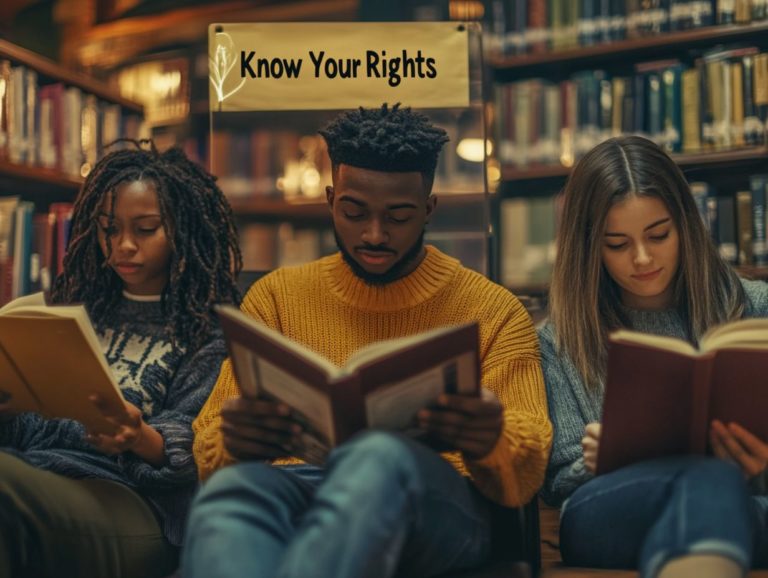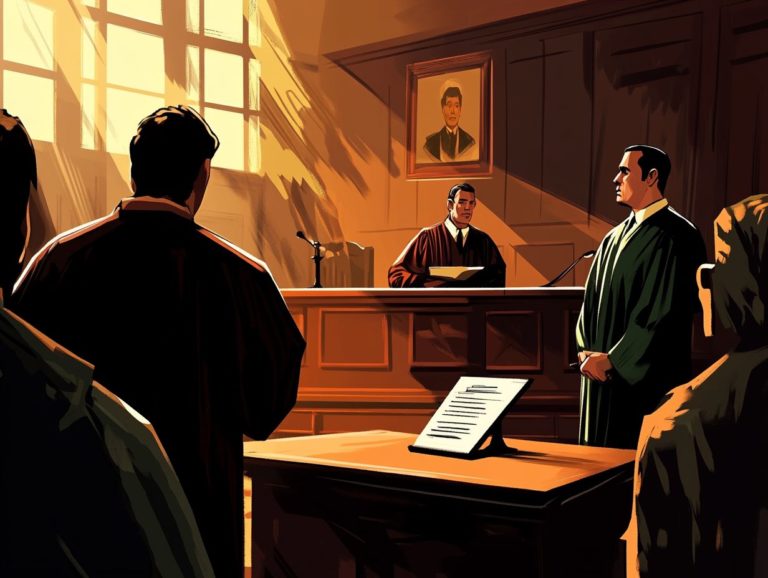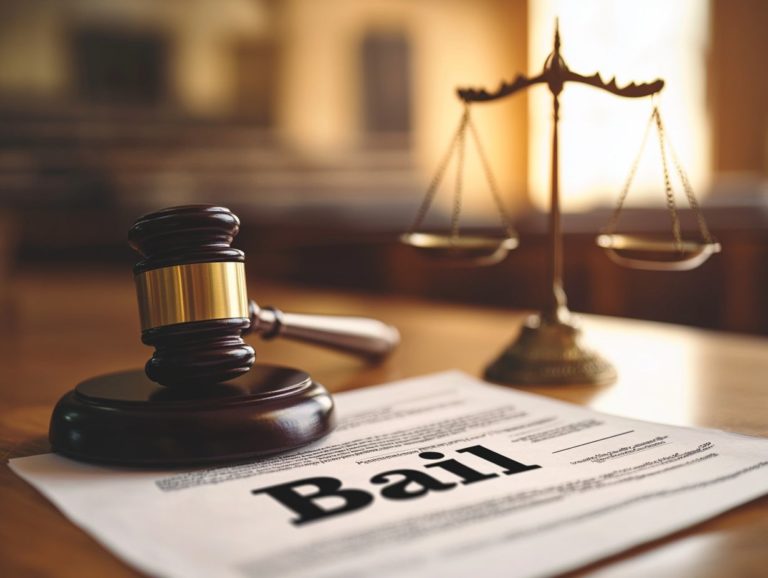Rights of the Accused in Different States
Understanding the complex world of legal rights can feel overwhelming, especially when facing criminal accusations. In the U.S., the rights of the accused are fundamental to justice and fairness.
This exploration covers essential rights. You will learn about due process, the presumption of innocence, and specific protections available across various states.
Discover the importance of legal representation, the demand for a speedy trial, and key safeguards like the Fifth Amendment. These rights uphold individual liberties and the integrity of our judicial system.
Contents
- Key Takeaways:
- Rights of the Accused in the United States
- Rights of the Accused in Different States
- Right to a Fair Trial
- Right to Legal Representation
- Right to a Speedy Trial
- Right to Remain Silent
- Frequently Asked Questions
- What are the rights of the accused in different states?
- Can the rights of the accused be different depending on the state they are in?
- How does the Sixth Amendment protect the rights of the accused in different states?
- Are there any specific rights of the accused that differ greatly between states?
- Do the rights of the accused in different states extend to all types of criminal cases?
- What should I do if I feel my rights as an accused person have been violated in a different state?
Key Takeaways:

- Each state has its own laws and protections for the accused, which may differ from federal laws.
- The right to a fair trial, including the presumption of innocence and due process, is guaranteed to everyone accused of a crime.
- Accused individuals can choose their legal representation from public defenders, private attorneys, or self-representation.
Rights of the Accused in the United States
The U.S. Constitution, especially the Bill of Rights, safeguards the rights of the accused. This framework ensures due process and protects against unjust prosecutions.
Key rights enshrined in the Fourth, Fifth, and Sixth Amendments include:
- The right to a fair trial.
- Representation by counsel.
- The ability to confront witnesses.
- Protection against double jeopardy.
Important Supreme Court cases, like Gideon v. Wainwright and Miranda v. Arizona, clarify these rights. They emphasize the need for an impartial jury and effective legal assistance.
Overview of the Legal System
The U.S. legal system is built on the principles of due process. It aims to protect the rights of individuals, especially those accused of crimes.
This system includes law enforcement, the judiciary, and correctional institutions, all working together to maintain justice.
Law enforcement agencies investigate and arrest suspects while ensuring constitutional rights are upheld. The judiciary, composed of judges and juries, conducts fair trials, allowing the accused to defend themselves.
Correctional institutions focus on rehabilitation after conviction. Together, they form a system that seeks to punish while protecting the rights of the accused, balancing societal safety and individual freedoms.
Rights of the Accused in Different States
The rights of the accused can vary significantly across states. Each state has its own legal framework and constitutional protections within the broader context of U.S. law.
Understanding these differences is essential for recognizing how rights like fair trial and legal representation are applied in real-life situations.
Comparison of State Laws and Protections
Comparar las leyes y protecciones estatales revela diferencias cr ticas en c mo se defienden tus derechos como acusado en el panorama legal de EE. UU. Estas variaciones pueden afectar significativamente la implementaci n del debido proceso.
Tu acceso a la representaci n legal tambi n puede verse afectado, ya que algunos estados ofrecen protecciones m s amplias que otros.
Esta disparidad en las salvaguardias legales puede influir profundamente en los resultados de los casos criminales y tu experiencia como demandado. Algunos estados han promulgado estatutos completos que garantizan un fuerte derecho a la defensa. Sin embargo, otros pueden enfrentar problemas de financiamiento inadecuado para defensores p blicos, dejando a muchas personas expuestas a una representaci n deficiente.
Los casos legales hist ricos, como Miranda v. Arizona, contin an moldeando estos derechos, pero su aplicaci n var a ampliamente. Esto lleva a inconsistencias en c mo se trata a las personas en diferentes jurisdicciones. Comprender estas diferencias es crucial para cualquiera que navega por las complejidades de la persecuci n penal, ya que pueden impactar significativamente en tu estrategia de defensa y en la equidad general del proceso judicial.
Right to a Fair Trial
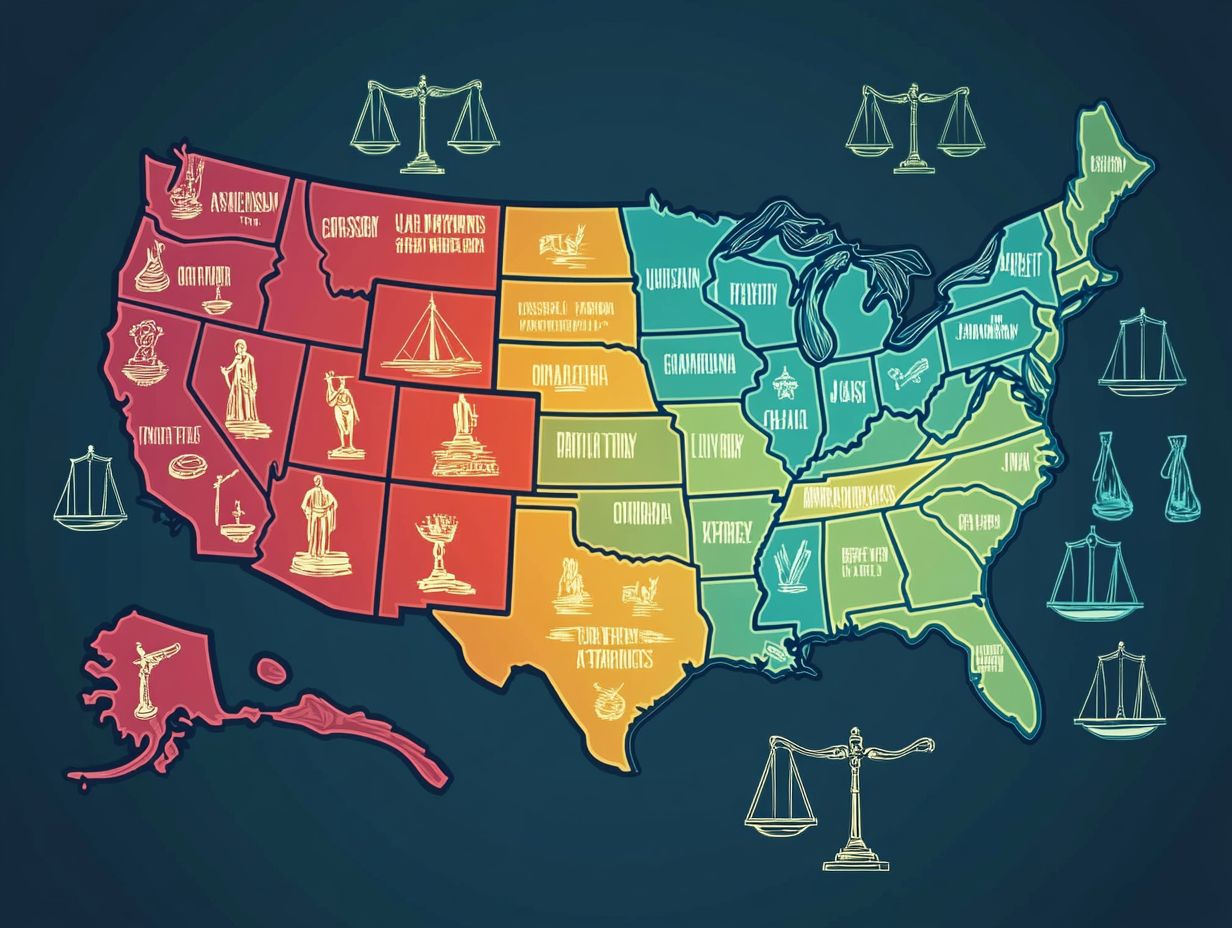
The right to a fair trial stands as one of the essential pillars of the rights afforded to the defendant in the United States. This principle guarantees that you receive an impartial jury and fair treatment throughout your legal journey.
It is meticulously crafted to prevent arbitrary justice and uphold the integrity of the criminal justice system.
Presumption of Innocence and Due Process
The presumption of innocence is a cornerstone of the legal system that protects your rights as a defendant. It firmly establishes that you are considered innocent until proven guilty in a court of law. This principle is crucial to ensuring a fair trial.
By placing the burden of proof squarely on the prosecution, this tenet allows you to prepare a strong defense without the looming cloud of guilt affecting the proceedings.
Landmark cases like Coffin v. United States and In re Winship have highlighted its importance. They confirm that the presumption of innocence not only safeguards individual rights but also bolsters public trust in the justice system.
As a result, this principle profoundly influences the dynamics of ongoing legal proceedings, illustrating that every individual accused of a crime is entitled to fair treatment while their case is under consideration.
Right to Legal Representation
The right to legal representation stands as a fundamental safeguard for the defendant in the United States. Established through landmark cases like Gideon v. Wainwright, this principle mandates that defendants receive effective assistance of counsel, regardless of their financial situation.
This vital right enables individuals to mount an adequate defense during criminal prosecution, ensuring that justice is not merely a privilege for the affluent.
Options for Legal Representation
When facing criminal charges, you have several options for legal representation. These include hiring a private attorney or seeking the services of a court-appointed lawyer. The choice you make can significantly impact your defense strategy and the overall outcome of your case.
Deciding between these options often depends on various factors, including your financial resources and the severity of the charges.
Private attorneys typically offer personalized attention and a wealth of experience, which can lead to more robust defense strategies. However, this option can be expensive and may not be feasible for everyone.
Conversely, court-appointed lawyers provide essential services for those who cannot afford private representation. While they play a crucial role, these attorneys may juggle multiple cases, which could compromise the quality of your defense.
Ultimately, the complexity of your case and the resources at your disposal will shape the rights and protections afforded to you as the defendant.
Right to a Speedy Trial
Your right to a speedy trial, as outlined in the Sixth Amendment, serves as a vital safeguard for you, ensuring that you are not subjected to unjust delays within the legal process.
This right is instrumental in preserving the integrity of the criminal justice system and reinforces the principle of timely justice. It allows you to navigate your case with a sense of urgency and fairness.
If you find yourself facing charges, it s crucial to seek legal advice promptly. Understanding your rights can make a significant difference in the outcome of your legal journey.
Time Limits and Exceptions
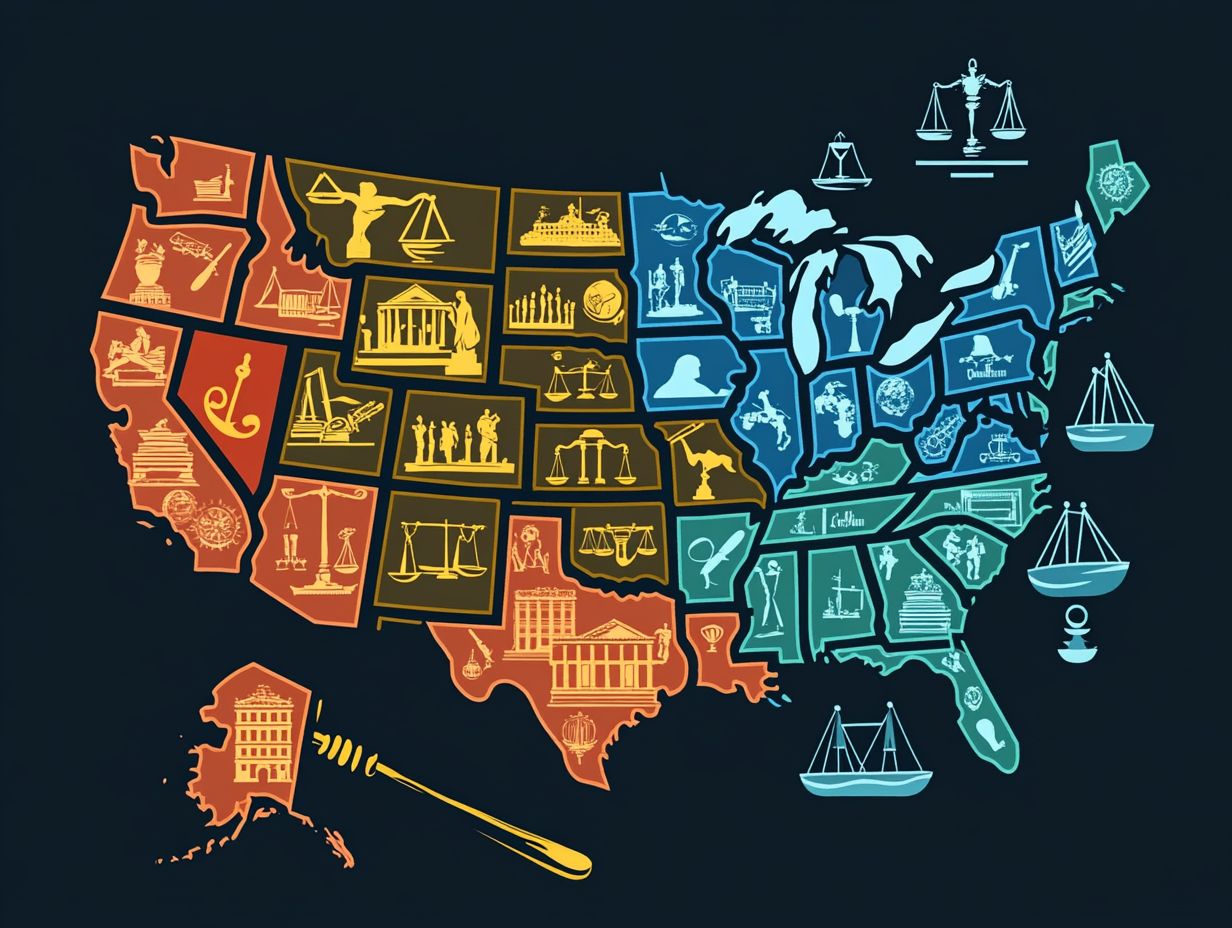
Your right to a speedy trial is not just a formality; it s essential for justice! Specific time limits and exceptions can vary by jurisdiction, making it crucial to understand these parameters to ensure your rights are upheld throughout legal proceedings.
In many jurisdictions, trials are expected to start within a few months of the indictment, typically around six months. However, various factors can influence this timeline. The complexity of your case, pretrial motions, and even the availability of witnesses can all play a role.
Unforeseen delays, like those from the pandemic or court backlogs, can extend these limits. Case law shows numerous instances where courts have strictly enforced these time frames, emphasizing the significance of this right.
When delays occur, the repercussions can be substantial for you, potentially leading to case dismissals or shifts in the prosecution’s strategy.
Right to Remain Silent
The right to remain silent is an essential aspect of the Fifth Amendment, safeguarding individuals from self-incrimination in legal contexts. This right is typically conveyed through the Miranda warning, a crucial notification that informs individuals of their legal rights upon being taken into custody.
Fifth Amendment Protections
The Fifth Amendment offers vital protections for you within the criminal justice system. It includes the right against self-incrimination and the promise of due process. These safeguards are fundamental for ensuring your rights are defended throughout legal proceedings.
Your right against self-incrimination enables you to refuse answering questions or providing information that might implicate you in criminal activity. This principle is essential in creating a fair legal environment, where you cannot be forced to testify against yourself.
The due process clause ensures that you receive fair treatment under the law, guaranteeing that the processes and procedures in trials are just and equitable. These protections come to life in many situations from police encounters, where you must be informed of your rights, to court trials, where strict adherence to procedural rules is enforced.
The importance of these constitutional guarantees is clear; they help balance governmental power and protect your individual freedoms, forming the cornerstone of a fair justice system.
Frequently Asked Questions
What are the rights of the accused in different states?
The rights of the accused vary from state to state, but they generally include the right to a fair trial, the right to remain silent, the right to confront witnesses, the right to an attorney, and the right to be presumed innocent until proven guilty.
Can the rights of the accused be different depending on the state they are in?

Yes, the rights of the accused can differ from state to state. Each state has its own laws and procedures for handling criminal cases, which can lead to variations in the rights afforded to the accused.
How does the Sixth Amendment protect the rights of the accused in different states?
The Sixth Amendment guarantees the right to a fair trial and provides protections for the accused, such as the right to counsel, the right to a speedy and public trial, and the right to an impartial jury. These rights apply to all states and are essential in ensuring a fair and just legal process for the accused.
Are there any specific rights of the accused that differ greatly between states?
While the basic rights of the accused are generally consistent across all states, there can be significant differences in procedures and protections. For example, some states allow for the death penalty, while others do not. Additionally, specific rules for evidence, sentencing, and appeals can also vary between states.
Do the rights of the accused in different states extend to all types of criminal cases?
Yes, the rights of the accused apply to all types of criminal cases, whether misdemeanors or felonies. However, some states may have different procedures for handling certain cases, such as juvenile cases or those involving capital punishment.
What should I do if I feel my rights as an accused person have been violated in a different state?
If you think your rights as an accused person have been violated, take action right away. It’s crucial to consult a lawyer who specializes in defending people accused of crimes.
This lawyer will understand the laws in the state where the violation happened. They can guide you on how to protect your rights and ensure you receive a fair legal process.




